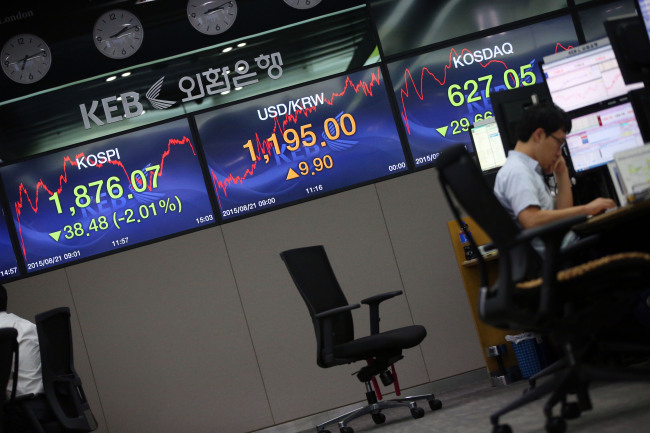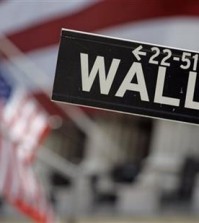- California Assembly OKs highest minimum wage in nation
- S. Korea unveils first graphic cigarette warnings
- US joins with South Korea, Japan in bid to deter North Korea
- LPGA golfer Chun In-gee finally back in action
- S. Korea won’t be top seed in final World Cup qualification round
- US men’s soccer misses 2nd straight Olympics
- US back on track in qualifying with 4-0 win over Guatemala
- High-intensity workout injuries spawn cottage industry
- CDC expands range of Zika mosquitoes into parts of Northeast
- Who knew? ‘The Walking Dead’ is helping families connect
Stocks, won plunge to 2-year low as inter-Korean conflict escalates
By Kim Jae-won
Seoul stocks plunged Friday, with already weak sentiment exacerbated by the escalating tension between the two Koreas after an exchange of fire across the western border the previous day, according to dealers.
Retail investors rushed to dump stocks on fears that the market will fall further on growing geopolitical risks and negative external factors.
KOSDAQ also dropped, affected by heavy retail sell-offs.
The KOSPI dropped 2.01 percent, or 38.48 points, to 1,876.07, slipping below the psychologically important 1,900 line for the first time in seven months. The tech-heavy KOSDAQ also fell 4.52 percent, or 29.66 points, to 627.05; while the Local currency lost 9.9 won to finish at 1,195 won against the U.S. dollar.
Analysts said retail investors led the market’s fall on concerns that stocks would suffer further falls on slowing economic growth in China, heightening tension on the Korean Peninsula and possible rate hikes in the United States.
Foreign investors were also sticking to selling positions, adding downward pressure to the overall market.
Rising tensions between the two Koreas will freeze investors’ sentiment, analysts said.
North Korea warned of war while South Korea raised its military readiness to its highest level since they exchanged artillery fire near the demilitarized zone, Thursday.
“Worries over war may dampen foreign investors’ sentiment temporarily,” said Lee Cheol-yong, an economist at LG Economic Research Institute. “If such worries deepen, it can spread to the real economy, freezing consumption further.”
“The KOSPI started weak due to underperforming U.S. stock markets. As China posted poor PMI data in the midday trading, local stock markets tumbled further,” said Shin Joong-ho, a senior strategist at eBest Securities.
Shin said it will take time for local stock markets to rebound because systemic problems, such as a U.S. rate hike, the weak Chinese economy and poor performances of local corporations are lingering on the markets.
The local currency also weakened at a faster pace. Samsung Securities expected Korean currency will lose its value against the greenback further, marking 1,250 won per dollar by the end of this year and 1,300 won in 2016.
Policymakers said they will monitor the financial market carefully, but ruled out the possibility that it will be hit hard by North Korean factors, referring to previous cases. They said the nation’s market has been resilient to provocations from North Korea for the past years, successfully absorbing shocks in a few days.














